Photo: Andrew Southam

news
Florida GRAMMY Showcase Participant Receives GRAMMY Nod
Singer/songwriter Francesca Battistelli receives a nomination for Best Gospel Performance
(For a complete list of 52nd GRAMMY Award winners, please click here.)
When nominations for the 52nd Annual GRAMMY Awards were announced Dec. 2 by The Recording Academy, the list included a Sunshine State surprise: Francesca Battistelli. The singer/songwriter received a nomination in the Best Gospel Performance category for the track "Free To Be Me" off her debut album My Paper Heart.
The surprise? Just four years prior, Battistelli was among the six unsigned-act finalists who performed at The Recording Academy Florida Chapter's 2005 Florida GRAMMY Showcase, an event she describes as a turning point in her career.
"What a journey it has been from that performance four years ago to today," says Battistelli. "My hope is to encourage other young musicians to take part in events such as the GRAMMY Showcase to gain feedback and live performance opportunities in the industry. I am amazed and thankful for this incredible experience, and it is a privilege to be recognized by The Recording Academy in this way."
"Francesca's success is a testament to her hard work and also shows the career boost that artists can receive from entering GRAMMY Showcase events," says Chapter Senior Executive Director Neil Crilly. "It's really great to see her talent recognized again at another level through our GRAMMY Awards process."
Battistelli was chosen as a Florida GRAMMY Showcase finalist by top music industry professionals from more than 230 entries submitted by Florida- and Puerto Rico-based artists. At the 2005 event the Florida Chapter donated 50 percent of the net proceeds to the MusiCares Hurricane Relief Fund, which provided direct assistance to those in the music community affected by that season's devastating hurricanes.
As a Florida native, Battistelli began her career at age 13 when she co-starred in the musical "The Bengal Tiger's Ball" and recorded the original cast album with GRAMMY-nominated artist Maureen McGovern. At age 15 she was the featured performer in the pop/R&B trio Bella, with which she appeared on programs such as "Ed McMahon's Next Big Star" and the "Miss Teen USA" pageant.
Inspired by artists from the jazz legends she was introduced to as a child to contemporaries such as Sara Bareilles, John Mayer and fellow contemporary Christian artist Nichole Nordeman, Battistelli set out to write personal reflections on life and faith for the tracks on My Paper Heart, which reached No. 4 on Billboard's Christian Albums chart. Prior to the release of My Paper Heart, Battistelli released an independent album in 2004, Just A Breath, and an EP in early 2008, I'm Letting Go. The singer/songwriter recently concluded a tour with Christian songwriter/guitarist Brandon Heath and GRAMMY-nominated Christian alternative group Leeland and is scheduled to continue touring in March.
The sixth edition of the Florida GRAMMY Showcase will take place on April 13 in Orlando, Fla., and six finalists will again be awarded the opportunity to perform live on opening night of the Florida Music Festival & Conference 2010 in Orlando. For more information, click here.
The 52nd Annual GRAMMY Awards will take place live on Sunday, Jan. 31 at Staples Center in Los Angeles and will be broadcast in HDTV and 5.1 Surround Sound at 8 p.m. (ET/PT) on CBS.
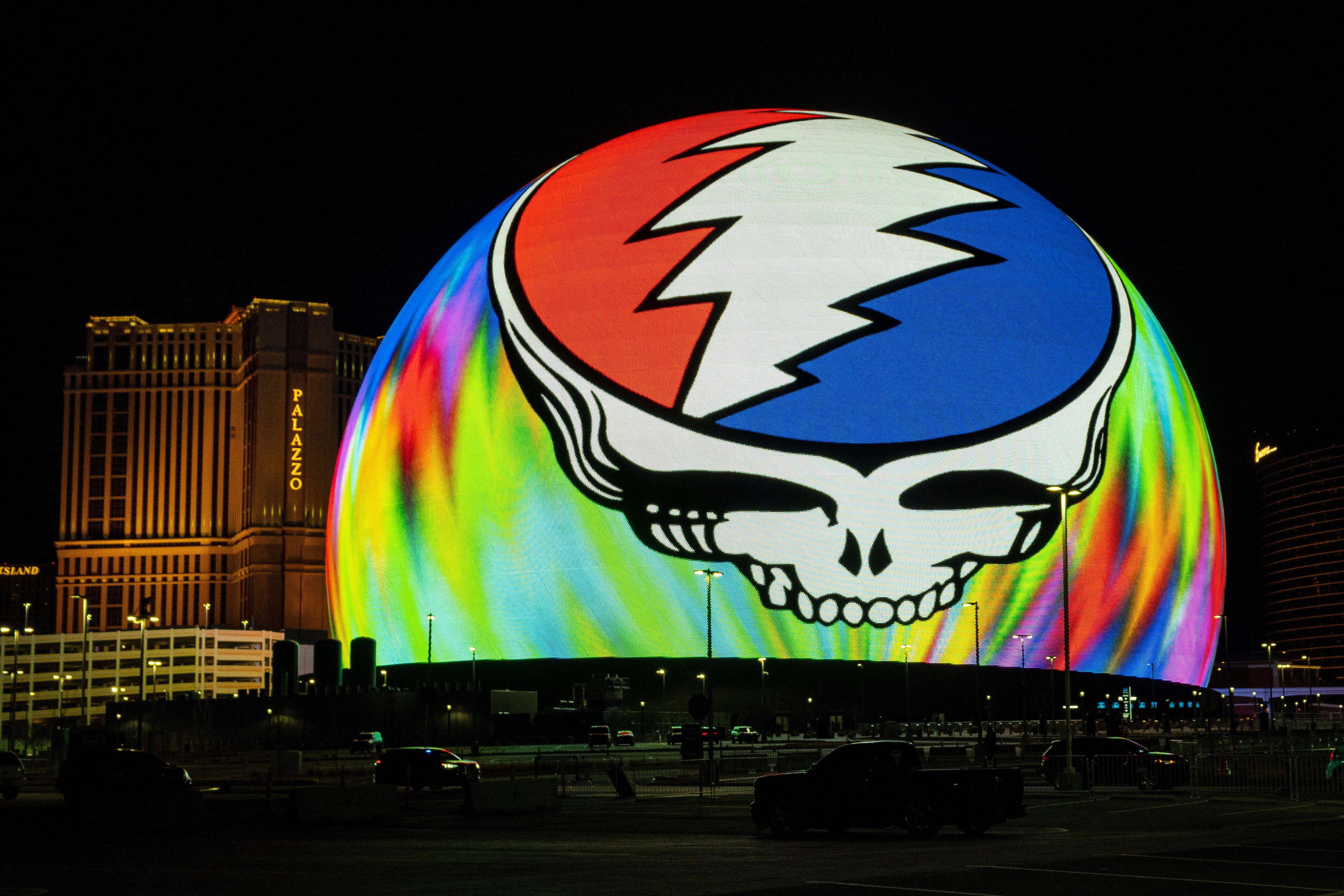
Photo: Kevin Carter
list
Why Dead & Company's Sphere Residency Is The Ultimate Trip
The 30-date Las Vegas residency is an unprecedented look at Dead & Co's live artistry. With stunning visuals and immersive technology, the Dead Forever residency takes attendees on an unpredictable, eye-popping vortex journey.
The scene on Saturday, July 13, was one mostly familiar to Dead & Company fans: Usual suspects Jeff Chimenti on keys, Oteil Burbridge on bass, Mickey Hart on drums, and John Mayer on guitar, a Silver Sky in hand. Grateful Dead co-founder Bob Weir dutifully approached the microphone to deliver one of the Dead’s best-known opening lyrics: "You tell me this town ain’t got no heart."
Throughout the evening, appreciative cheers and whistles sounded at the first notes of a classic, like this one, intermingling with the hints of marijuana in the air. The crowd of thousands, who’d traveled from both near and far for the occasion, swayed to the music. Largely clad in the tie-dye t-shirts customary to the Dead fandom, they comprised a vivid sea of color, visible even in the venue’s dimmest lighting.
Bathed in the glow of a key anomaly — a 160,000-square-foot curved LED canvas — a Deadhead sitting in the row ahead of me turns around and asks if I’m enjoying the show (I am). When I return the question, he is emphatic, his response succinct: "it’s transformative."
He’s not wrong in that the audiovisual spectacle — which wrapped its eighth of 10 weeks this past weekend — metamorphoses Dead & Company’s concert format. Since it debuted in May, the now 30-date Las Vegas residency, dubbed Dead Forever, has attracted old-school and new-generation Deadheads, as well as curious first-timers. From one-of-a-kind production tools, like its 16K LED display (the highest-resolution display in the world, per developers) and stereographic projection, Sphere has empowered Dead & Company to carry forth the legacy of one of the most fervently-loved bands in American music history, with unprecedented storytelling capacities and complete creative control.
Read on for four reasons why Dead & Company’s residency at Las Vegas’ most-talked-about venue is the rock outfit like they’ve never been seen before.
The Meeting Of Music & Visuals Allows For True Narration
For the nearly four hours that Dead & Company play each Thursday, Friday, and Saturday of a residency week, the domed venue adjacent to the Venetian transforms from Sphere to spaceship. Narratively, the show is stylized as a long, strange trip through space that issues nods to the Grateful Dead’s history.
It’s only fitting that this story begins in San Francisco, where the Dead’s townhouse in the heart of the Haight-Ashbury district becomes the focal point of the audiovisual journey’s intro. The 360-degree view of the Dead’s residence and the larger row of townhouses to which it belongs pans to a drone shot of the Bay Area at golden hour and soon thereafter, outer space.
Visually, attendees travel through time and space in an unpredictable, eye-popping vortex of fantasticality (and sometimes, reality). Take, for example, the segment that recreates the Dead’s performance at the Great Pyramid in Giza, Egypt. The scene is punctuated by black bats that flap swiftly through the desert landscape — a detail that comes as a surprise to those in the audience, and one ultimately added based on Weir’s recollection of this very phenomenon during the 1978 event, Mayer tells GQ.
Before Dead & Company bring Dead Forever full-circle by returning to 710 Ashbury Street at the show’s close, the show winds through a colorful, circuitous run of visuals: the Dead’s iconic technicolor dancing bears, Cornell University’s Barton Hall, and a wall made entirely of digital reproductions of Dead event posters and hard tickets. The show’s depth of reference is plunging, and Sphere’s technology allows the story to play like an abstract movie that blurs timelines, affording Dead & Company an unusual and nonpareil opportunity to leverage live storytelling in a way they’ve never before been able to.
While Dead Forever is accessible purely as a visual marvel, for the initiated, it is rife with Easter eggs. Its historical allusions are familiar touch points for the Deadheads who hopped on the metaphorical bandwagon back when Jerry Garcia was at its helm. Although some of its segments will evade those less fluent in the Dead’s storied past, they can nevertheless serve as educational gateways to it (and to greater, deeper fandom) for those who leave the show wanting to learn more.
Read more: A Beginner’s Guide To The Grateful Dead: 5 Ways To Get Into The Legendary Jam Band
In A Way, Everything Is New
Whether one has seen Dead & Company once, five times, 20 times, or never before matters not, for Dead Forever is a brand-new show. Familiarity with the Grateful Dead’s legacy and its contemporary offshoot's genesis certainly enriches the overall experience, but it’s not a requisite to enjoy the show, making the residency a particularly good entry point for the Dead & Company-curious who may have missed them on The Final Tour in 2023.
Dead Forever levels the playing field for attendees in that, apart from the songs on the setlist, the residency represents net-new material. The marriage of music and visuals makes each of the 18 tunes new from the standpoint of an audiovisual experience, and the novelty of Dead Forever deepens for even the most experienced Deadhead.
"When I was growing up, ‘Drums’ was always my bathroom song, but now you don’t want to miss it," an attendee tells GRAMMY.com at the end of the first set (Dead & Company play one six- or seven-song set and take a 30-minute intermission before beginning the evening’s second and final set).
A customary part of the Dead’s sets, "Drums/Space" is an extended percussion segment that takes on new life in Dead Forever. Led by Mickey Hart, the set two standout is where sound evolves into physical feeling. As this portion of the show starts, the curved LED canvas swirls with images of different drums that move wildly as Hart and Jay Lane (who stands in for Grateful Dead co-founding member, Bill Kreutzmann) diligently drum, steadily increasing the pace and intensity with which they do so. The instruments that grace Sphere’s screen are Hart’s own, the drummer tells Variety. Following 3D-photographing that enables them to be displayed in this fashion, an ensemble of at least 10 different drums joins the visual jamboree.
The cinematic, multisensory nature of this segment grows increasingly climactic, with the percussion becoming so thunderous it becomes physical. No surprise, considering Sphere’s immersive, crystal-clear sound system, or the fact that 10,000 of the venue’s 17,385 seats are haptic seats that can vibrate in time with the mounting percussion. This technology transforms "Drums/Space" and allows a customary piece of the Dead’s traditional sets to be heard, seen, and felt anew.
The Environment Is Unusually Immersive —And Intimate
Upon mention of Sphere’s size — the globe measures 875,000 square feet and can accommodate up to 20,000 people — "intimate" is not the first word to come to mind. Still, the venue felt remarkably intimate during Dead & Company’s final performance of July.
This was owed in equal parts to its self-contained design and its immersive visual environment, in which Sphere’s LED screen wraps over and behind the audience. However uncannily, the latter contributes to a sense of closeness, creating the illusion that Sphere, its visual displays, and its audience are situated much more closely than they actually are.
Its 580,000-square-feet of LEDs, coupled with its 360-degree shape and structure, render Sphere the most immersive live music venue in the world. To that end, it’s not hyperbolic or unreasonable to call Dead Forever Dead & Company’s most immersive live venture yet.
Of course, the Dead Forever narrative — a trip through space undertaken together, as one community — only adds to the show’s combined sense of intimacy and immersion.
No Show Is The Same
It’s not out of character for Dead & Company to play no repeats across consecutive evenings (as they did at San Francisco’s Oracle Park, where they laid their touring career to rest last July), and Dead Forever is no exception. Apart from "Drums/Space" — the sole item on the setlist that recurs each night — the 17 other songs that the band will play and their visual accompaniments are left to Dead & Company’s whim.
"What’s become really interesting — and I would say it’s a challenge, but it’s a really fun one — is that not only do you have to make the songs work in some kind of a flow for the setlist, but every piece of content has maybe eight or 10 songs that can go with it," Mayer told Variety.
No show is the same, yielding similar but unique viewing experiences across a given residency weekend and, more broadly, the portfolio of Dead Forever shows performed to date. This aspect has enticed avid fans to return not once, not twice, but three times in a given weekend, to see a fuller scope of what Dead Forever has to offer across its many possible variations.
With the residency’s July run now in the rearview, Dead & Company will take a brief break before returning to Sphere Aug. 1-3 and 8-10 for the final Dead Forever trips — for now.
Explore The World Of Rock

HARDY On New Album 'Quit!!' & How "Trying To Push My Own Boundaries" Has Paid Off

A Beginner’s Guide To Phish: 8 Ways To Get Into The Popular Jam Band
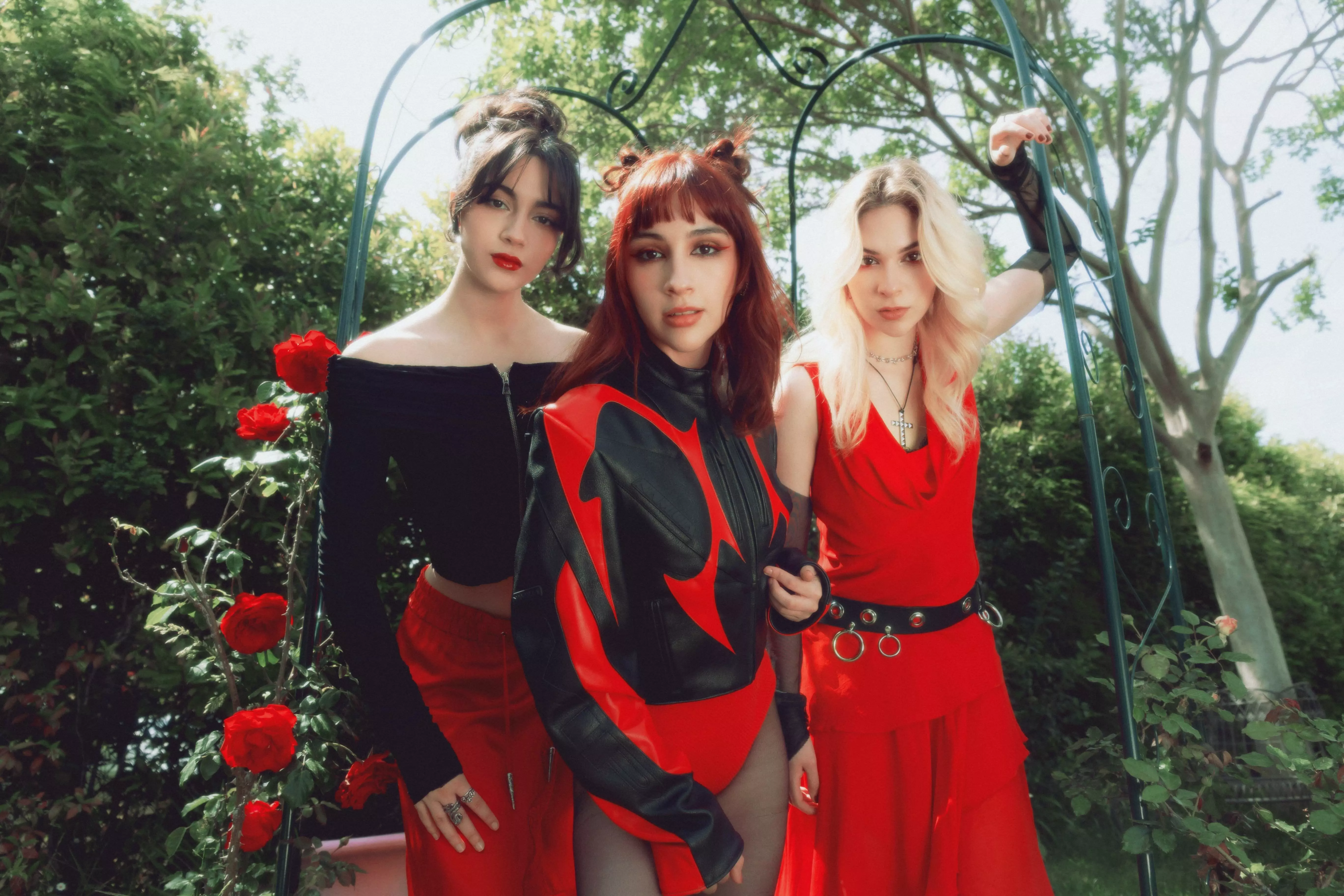
Mexican Rockers The Warning On 'Keep Me Fed' & "The Possibility That We Could Literally Do Everything"

Watch Red Hot Chili Peppers Win Best Rock Album
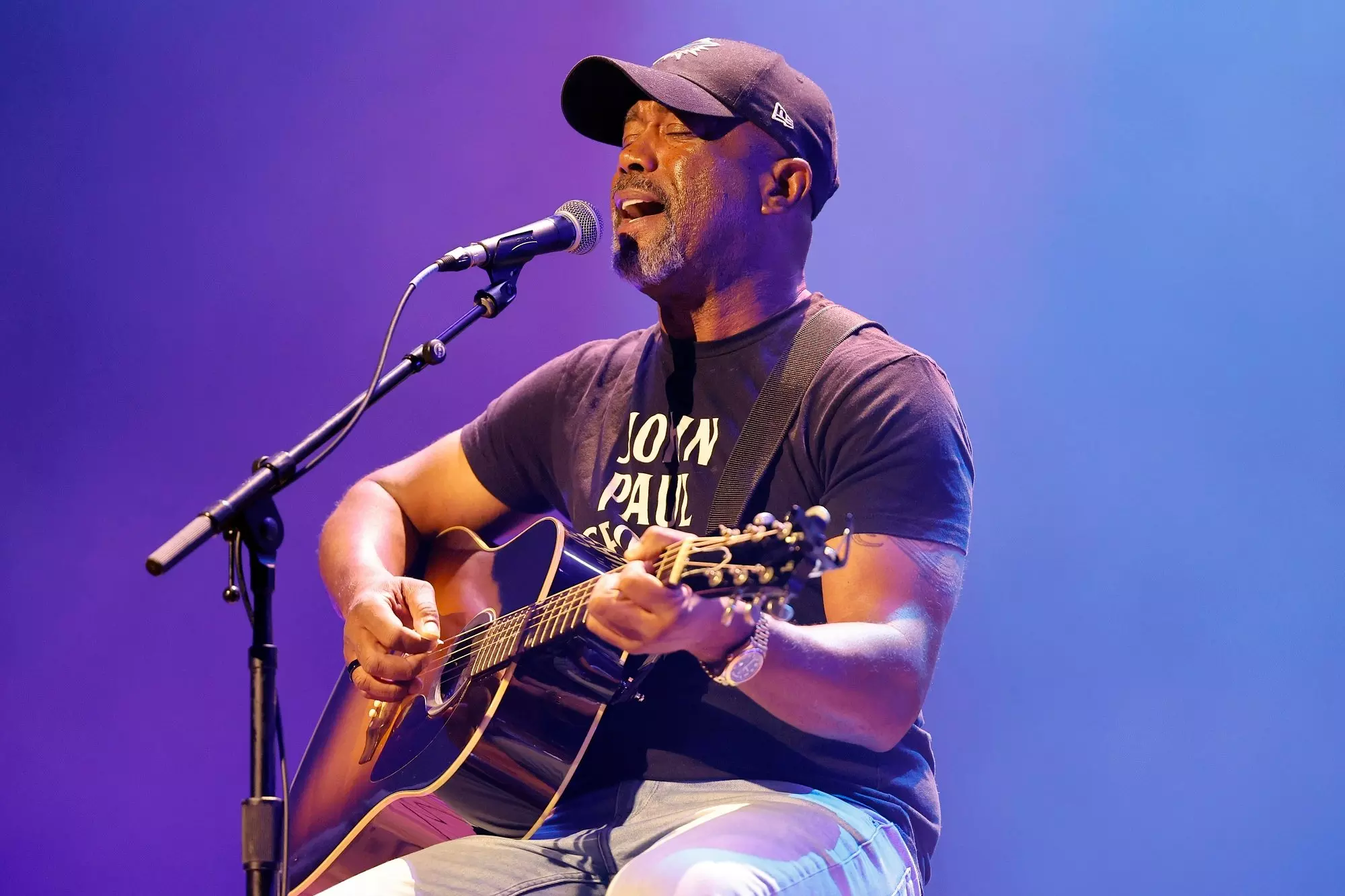
Darius Rucker Shares Stories Behind 'Cracked Rear View' Hits & Why He's Still Reveling In "A Dream Come True"
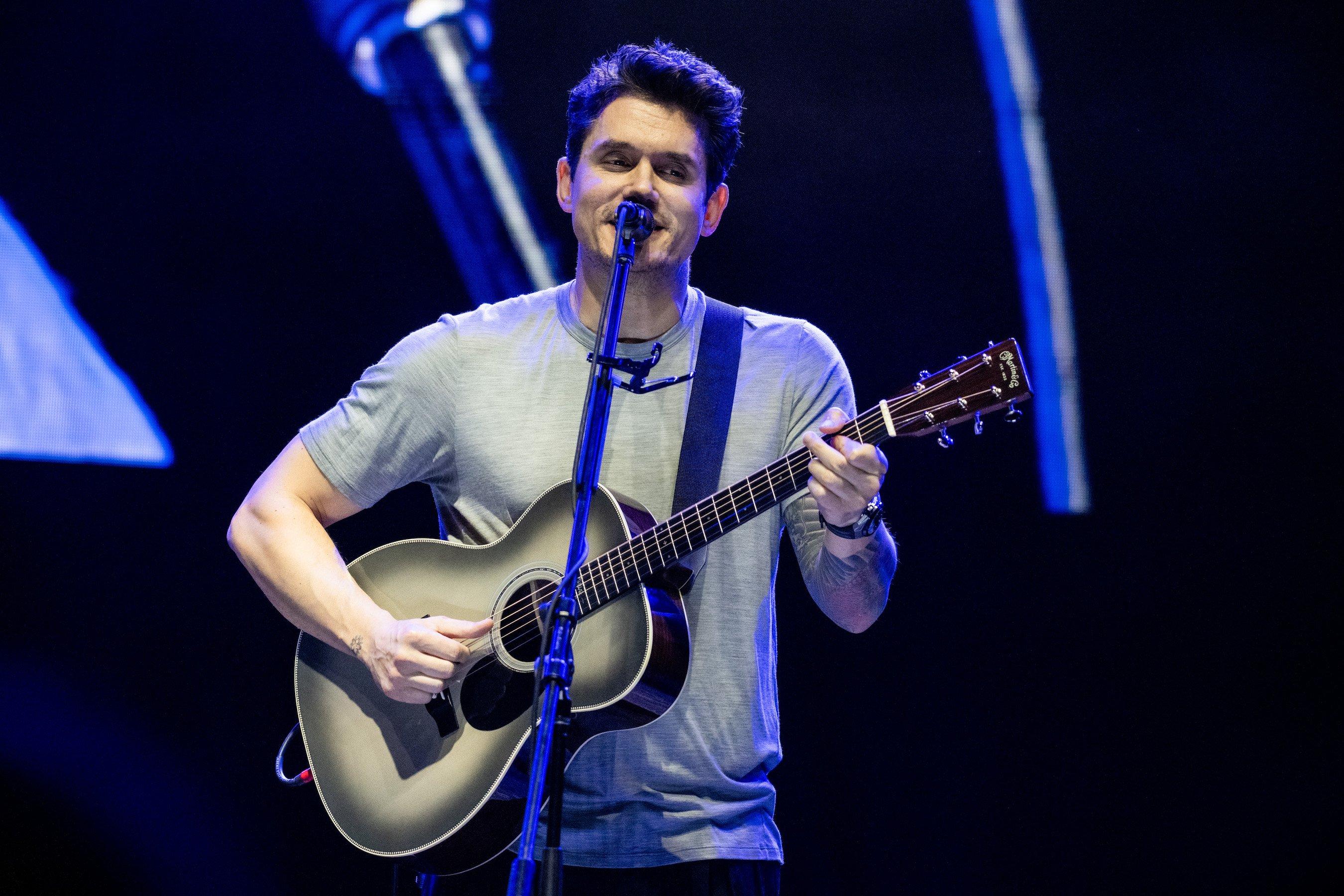
Photo: Timothy Norris/Getty Images
list
10 John Mayer Songs That Show His Versatility, From 'Room For Squares' To Dead & Co
As John Mayer launches his latest venture with Dead & Company — a residency at the Sphere in Las Vegas — revisit 10 songs that show every side of his musical genius.
At the 2003 GRAMMYs, a 25-year-old John Mayer stood on stage at Madison Square Garden, his first golden gramophone in hand. "I just want to say this is very, very fast, and I promise to catch up," he said with a touch of incredulity.
In the two decades that have followed his first GRAMMY triumph, it's safe to say that Mayer, now 46, has caught up. Not only has the freewheeling guitarist and singer/songwriter won six more GRAMMYs — he has also demonstrated his versatility across eight studio albums and countless cross-genre collaborations, including his acclaimed role in The Grateful Dead offshoot, Dead & Company. But the true testaments to his artistic range lie simply within the music.
Over the years, Mayer's dynamism has led him to work deftly and convincingly within a wide variety of genres, from jazz to pop to Americana. The result: an elastic and well-rounded repertoire that elevates 2003's "Bigger Than My Body" from hit single to self-fulfilling prophecy.
From March 2023 to March 2024, Mayer took his protean catalog on the road for his Solo Tour, which saw him play sold-out arenas around the world, mostly acoustic, completely alone. The international effort harkened back to Mayer's early career days, when standing alone on stage, guitar in hand, was the rule rather than the exception. Just after his second Solo leg last November, Mayer added radio programming and curation to his resume via the launch of his Sirius XM channel, Life with John Mayer. Fittingly, XM bills the channel (No. 14) as one notably "defined not by genre, but by the time of day, as well as the day of the week."
Mayer's next venture sees him linking back up with Dead & Company, for a 24-show residency at the Sphere in Las Vegas from May 16 to July 13. In honor of his latest move, GRAMMY.com explores the scope of Mayer's musical genius by revisiting 10 essential songs that demonstrate the breadth of his range, from the very beginning of his discography.
"Your Body Is A Wonderland," Room For Squares (2001)
The second single from Mayer's debut album, "Your Body Is A Wonderland" became an almost instant radio favorite like its predecessor, "No Such Thing," earning Mayer his second consecutive No. 1 on Billboard's Adult Alternative Airplay chart. The song's hooky pop structure provided an affable introduction to Mayer's lyrical skill by way of smart, suggestive simile and metaphor ("One mile to every inch of/ Your skin like porcelain/ One pair of candy lips and/ Your bubblegum tongue") ahead of Room For Squares' release later that June. The breathy hit netted Mayer his first career GRAMMY Award, for Best Male Pop Vocal Performance, at the 45th Annual GRAMMY Awards in 2003.
In recent years, Mayer — who penned the song when he was 21 — has chronicled his tenuous relationship with "Your Body is a Wonderland" in his infamous mid-concert banter, playfully critiquing the song's lack of "nuance." Following a perspective shift, Mayer has come to embrace his self-proclaimed "time capsule"; it was a staple of his set lists for his Solo Tour.
"Who Did You Think I Was," TRY! - Live in Concert (2005)
The product of pure synergy and serendipity, the John Mayer Trio assembled after what was intended to be a one-time stint on the NBC telethon, "Tsunami Aid: A Concert of Hope," in 2005. The benefit appearance lit the creative fuse between Mayer, bassist Pino Palladino and drummer Steve Jordan — who, over the years, have also played alongside the singer on his headline tours.
The John Mayer Trio propelled its eponymous artist from pop territory to a bluesy brand of rock 'n' roll that then demonstrated his talent as a live guitarist to its greatest degree yet. The Trio's first and only release, TRY! - Live in Concert, was recorded at their September 22, 2005 concert at the House of Blues in Chicago.
Mayer acknowledges his abrupt sonic gear shift on TRY! opener, "Who Did You Think I Was." "Got a brand new blues that I can't explain," he quips, then later asks, "Am I the one who plays the quiet songs/ Or is he the one who turns the ladies on?"
"Gravity," Continuum (2006)
Though "Waiting On the World to Change" was the biggest commercial hit from 2006's Continuum, "Gravity" remains the pièce de résistance of Mayer's magnum opus. Its status as such is routinely reaffirmed by the crowds at Mayer's concerts, whose calls for a live performance of his quintessential soul ballad can compete even with Mayer's mid-show remarks.
The blues-tinged slow burn marries Mayer's inimitable vocal tone with his guitar muscle on a record that strides far beyond the pop and soft rock of his preceding studio albums. Though Continuum builds on the blues direction Mayer ignited with TRY!, it does so with greater depth and technique, translating to a concept album, sonically, that evinces both his breakaway from the genres that launched his career and his skill as a blues guitarist — and "Gravity" is a prime example.
"I'm very proud of the song," Mayer mused on his Sirius XM station. "It's one of those ones that's gonna go with me through the rest of my life, and I'm happy it's in the sidecar going along with me."
"Daughters," Where the Light Is: John Mayer Live in Los Angeles (2008)
"Daughters" wasn't Mayer's first choice of a single for his sophomore LP, 2003's Heavier Things, but at Columbia Records' behest — "We really want it to go, we think it can be a hit," Mayer recalled of their thoughts — the soft-rock-meets-acoustic effort joined the album rollout. Columbia's suspicions were correct; "Daughters" topped Billboard's Adult Pop Airplay in 2004 — his only No. 1 entry on the chart to date.
But "Daughters" didn't just enjoy heavy radio rotation — it also secured Mayer his first and only GRAMMY win in a General Field Category. The Heavier Things descendant took the title of Song Of The Year at the 47th Annual GRAMMY Awards in 2005, helping Mayer evade music's dreaded "sophomore slump."
While the studio version may be the GRAMMY-winning chart-topper, Mayer's live rendition of "Daughters" during his December 8, 2007 performance at Los Angeles' Nokia Theater for Where the Light Is: John Mayer Live in Los Angeles compellingly demonstrated the power of the song — and his acoustic chops.
"Edge of Desire," Battle Studies (2009)
Come 2009, what critics almost unanimously proclaimed to be Mayer's biggest musical success had become his Achilles heel; everyone wanted another Continuum. But as they were to learn, Mayer never repeats himself. Thus came Battle Studies.
Born from a dismantling and transformative breakup, his fourth studio album arguably only becomes fully accessible to listeners after this rite of passage. Mired in introspection and pop rock, Battle Studies broadly engages with elements of pop with a sophistication that distinguishes it from Mayer's earlier traverses in pop and pop-inflected terrain.
His artistry hits a new apex on "Edge of Desire," a visceral and tightly woven song that remains one of the strongest examples of his mastery of prosody — the agreement between music and lyrics that results in a resonant and memorable listening experience.
"Born and Raised," Born & Raised (2012)
On the title track of his fifth studio album, Mayer distills growing up (and growing older) into a plaintive reflection on the involuntary, inevitable, and, in the moment, imperceptible phenomenon. He grapples with this vertigo of the soul on a record that, 12 years later, remains among his most barefaced lyrically.
The tinny texture of a harmonica, heard first in the intro, permeates the song, serving as its single most overt indicator of the larger stylistic shift that Born & Raised embodies. The 12-song set embraces elements of Americana, country and folk amid simpler-than-usual chord progressions for Mayer, whose restraint elevates the affective power of the album's lyricism.
"Born and Raised - Reprise," with which Born & Raised draws to a close, is evidence of Mayer's well-demonstrated dexterity. In its sanguine, folk spirit, the album finale juxtaposes "Born and Raised" both musically and lyrically. "It's nice to say, 'Now I'm born and raised,'" Mayer sings as the last grains of sand in Born & Raised's hourglass fall.
"Wildfire," Paradise Valley (2014)
Even before Paradise Valley hit shelves and digital streaming platforms, the cowboy hat that Mayer dons in the album artwork intimated that the hybrid of Americana, country, and folk he embraced on Born & Raised wasn't going anywhere — at least not for another album. The sunbaked project was a gutsy sidestep even further away from his successful commercial formula, and finds him expanding his stylistic fingerprint across 11 tracks that run the gamut of American roots music.
"Wildfire," the breezy toe-tapper with which Paradise Valley opens, grooves with Jerry Garcia influence. It is therefore unsurprising that many interpret "We can dance with dead/ You can rest your head on my shoulder/ If you want to get older with me," to be a lyrical nod to the Dead. Perhaps uncoincidentally, Mayer's invitation to become a member of Dead & Company came one year after the release of Paradise Valley.
"Shakedown Street," Live at Madison Square Garden (2017)
There is perhaps no better example of Mayer's dynamism than his integration in Dead & Company. The Grateful Dead offshoot, formed in 2015, intersperses Mayer among three surviving members of the band — Bob Weir, Mickey Hart, and Bill Kreutzmann — as well as two more newcomers, Oteil Burbridge and Jeff Chimenti. Mayer's off-the-cuff guitar solos and vocal support at Dead & Co's concerts are the keys that have unlocked a new plane of musicianship for Mayer, the solo artist.
This is evident on "Shakedown Street," a staple of The Grateful Dead's – and now, Dead & Company's – set lists. The languid, relaxed number gives Mayer the space to improvise guitar solos and use his vocals in a looser style than how he sings his own productions, all while feeding off the energy of his fellow band members. In addition to being one of The Dead's best-known songs, "Shakedown Street" is also the name of the makeshift bazaar where "Deadheads" socialize and sell wares ranging from grilled cheeses to drink coasters emblazoned with The Grateful Dead logo outside Dead & Company concerts.
Mayer's long, strange trip with (and within) the jam band has cross-pollinated his and The Grateful Dead's respective fandoms, attracting scores of Dead & Co listeners to his own headline shows, and vice versa. The takeaway: Mayer's involvement with Dead & Company offers a new, comparatively more rugged and improvisational lens through which to view his artistry.
"You're Gonna Live Forever in Me," The Search for Everything (2017)
"You're Gonna Live Forever in Me" evokes the sense of walking in, unexpected and undetected, to one of Mayer's writing sessions, watching him sing the freshly-penned piano ballad. This is owed to the song's abstract lyricism, the sentiment of which is deeply personal and universally accessible — a juxtaposition that's not often easy to achieve in songwriting. (Take, for example, "A great big bang and dinosaurs/ Fiery raining meteors/ It all ends unfortunately/ But you're gonna live forever in me.") But the studio version of "You're Gonna Live Forever in Me" also happens to be the original vocal take, adding to the feeling that Mayer is fully engrossed in a moment of poignant reflection mediated by music.
"I sat at the piano for hours teaching myself how the song might go. I sang it that night, and that was it…I couldn't sing the vocals again if I tried," Mayer recalled in a 2017 interview with Rolling Stone.
Mayer's lilted, Randy Newman-esque singing on the track finds him unintentionally but impactfully adopting a vocal technique distinctive from anything he's ever done before.
"Wild Blue," Sob Rock (2021)
Buoyed by a honeyed hook and slick production from No I.D., "New Light" was the unequivocal commercial standout of Sob Rock, a soft-grooving pastiche of '80s influence. Though the catchy pop-informed number finds Mayer stylistically diversifying by working with "The Godfather of Chicago Hip-Hop" (whose credits include Kanye West, JAY-Z, and Common, to name just a few), a look beyond the Sob Rock frontrunner reveals evidence of more sonic experimentation on the album.
Cue "Wild Blue." In its hushed, double-tracked vocals, the song plays like a love letter to JJ Cale. Mayer's whispery vocal emulation of the rock musician yields another new, but still polished, strain of John Mayer sound.
With hints of the '70s embedded within its taut production, "Wild Blue" is a beatific semi-departure from its parent album's '80s DNA. Together, they evince Mayer's ability to work not only across genres but also across sounds from different decades in music — further proof that his artistic range is both broad and timeless.
A Beginner’s Guide To The Grateful Dead: 5 Ways To Get Into The Legendary Jam Band

Photo: Jeff Kravitz/FilmMagic
video
GRAMMY Rewind: Kendrick Lamar Honors Hip-Hop's Greats While Accepting Best Rap Album GRAMMY For 'To Pimp a Butterfly' In 2016
Upon winning the GRAMMY for Best Rap Album for 'To Pimp a Butterfly,' Kendrick Lamar thanked those that helped him get to the stage, and the artists that blazed the trail for him.
Updated Friday Oct. 13, 2023 to include info about Kendrick Lamar's most recent GRAMMY wins, as of the 2023 GRAMMYs.
A GRAMMY veteran these days, Kendrick Lamar has won 17 GRAMMYs and has received 47 GRAMMY nominations overall. A sizable chunk of his trophies came from the 58th annual GRAMMY Awards in 2016, when he walked away with five — including his first-ever win in the Best Rap Album category.
This installment of GRAMMY Rewind turns back the clock to 2016, revisiting Lamar's acceptance speech upon winning Best Rap Album for To Pimp A Butterfly. Though Lamar was alone on stage, he made it clear that he wouldn't be at the top of his game without the help of a broad support system.
"First off, all glory to God, that's for sure," he said, kicking off a speech that went on to thank his parents, who he described as his "those who gave me the responsibility of knowing, of accepting the good with the bad."
Looking for more GRAMMYs news? The 2024 GRAMMY nominations are here!
He also extended his love and gratitude to his fiancée, Whitney Alford, and shouted out his Top Dawg Entertainment labelmates. Lamar specifically praised Top Dawg's CEO, Anthony Tiffith, for finding and developing raw talent that might not otherwise get the chance to pursue their musical dreams.
"We'd never forget that: Taking these kids out of the projects, out of Compton, and putting them right here on this stage, to be the best that they can be," Lamar — a Compton native himself — continued, leading into an impassioned conclusion spotlighting some of the cornerstone rap albums that came before To Pimp a Butterfly.
"Hip-hop. Ice Cube. This is for hip-hop," he said. "This is for Snoop Dogg, Doggystyle. This is for Illmatic, this is for Nas. We will live forever. Believe that."
To Pimp a Butterfly singles "Alright" and "These Walls" earned Lamar three more GRAMMYs that night, the former winning Best Rap Performance and Best Rap Song and the latter taking Best Rap/Sung Collaboration (the song features Bilal, Anna Wise and Thundercat). He also won Best Music Video for the remix of Taylor Swift's "Bad Blood."
Lamar has since won Best Rap Album two more times, taking home the golden gramophone in 2018 for his blockbuster LP DAMN., and in 2023 for his bold fifth album, Mr. Morale & the Big Steppers.
Watch Lamar's full acceptance speech above, and check back at GRAMMY.com every Friday for more GRAMMY Rewind episodes.
10 Essential Facts To Know About GRAMMY-Winning Rapper J. Cole
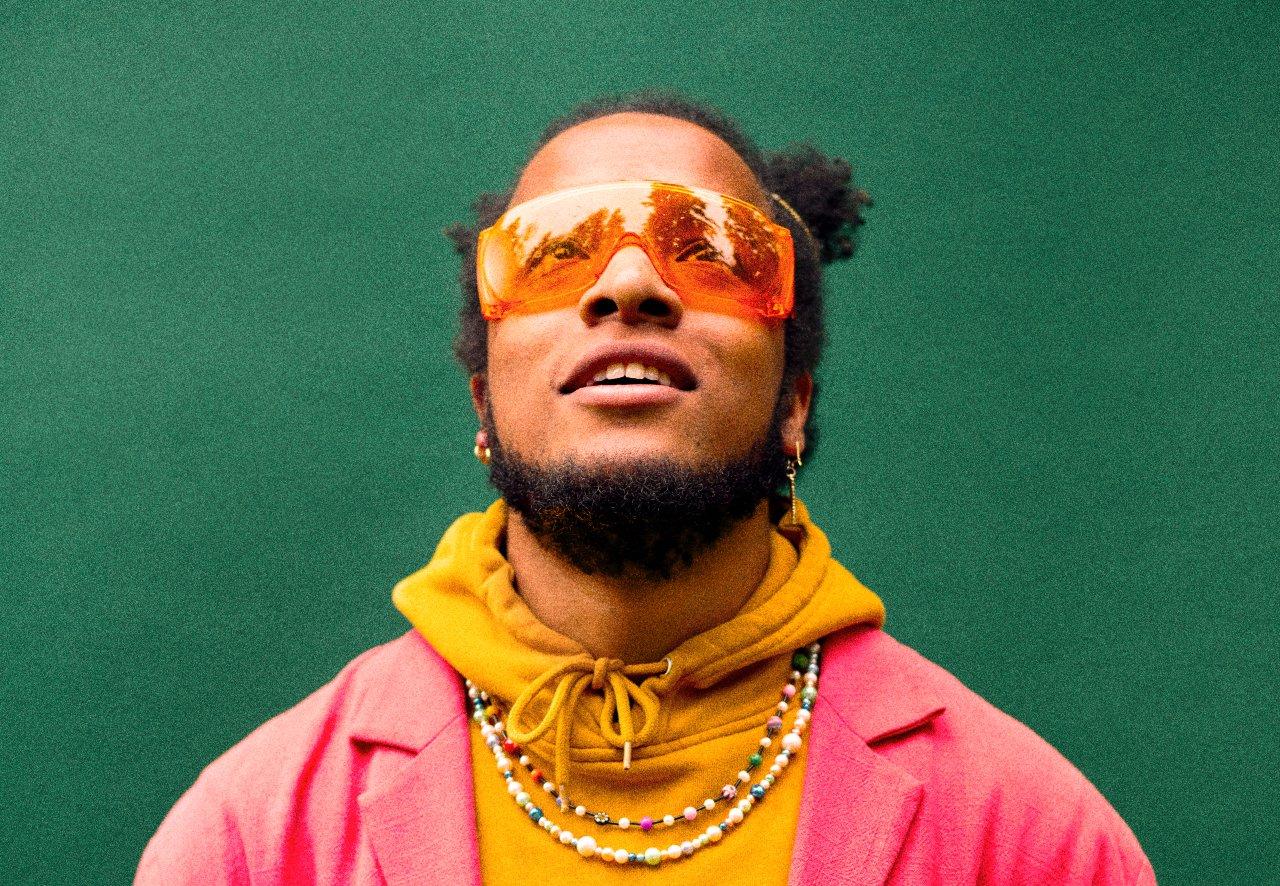
Photo: Meron Menghistab
interview
Cautious Clay's 'Karpeh' Is & Isn't Jazz: "Let Me Completely Deconstruct My Conception Of The Music"
On his Blue Note Records debut 'Karpeh,' Cautious Clay treats jazz not as a genre, but as a philosophy — and uses it as a launchpad for a captivating family story.
Nobody can deny Herbie Hancock is a jazz artist, but jazz cannot box him in. Ditto Quincy Jones; those bona fides are bone deep, but he's changed a dozen other genres.
Cautious Clay doesn't compare himself to those legends. But he readily cites them as lodestars — along with other genre-straddlers of Black American music, like Lionel Richie and Babyface.
Because this is a crucial lens through which to view him: he's jazz at his essence and not jazz at all, depending on how he wishes to express himself.
"I'm not really a jazz artist, but I feel like I have such a deep understanding of it as a songwriter and musician," the artist born Joshua Karpeh tells GRAMMY.com. "It's sort of inseparable from my approach to this album, and to this work with Blue Note."
Karpeh is talking about, well, KARPEH — his debut album for the illustrious label, which dropped in August. In three acts — "The Past Explained," "The Honeymoon of Exploration," and "A Bitter & Sweet Solitude," he casts his personal journey against the backdrop of his family saga.
As Cautious Clay explains, the title is a family name; his grandfather was of the Kru peoples in Liberia. "It's a family of immigrants. It's a family of, obviously, Black Americans," he notes. "I just wanted to give an experience that felt concrete and specific enough — to be able to live inside of something that was a part of my journey."
On KARPEH, Cautious Clay is joined by esteemed Blue Note colleagues: trumpeter Ambrose Akinmusire, saxophonist Immanuel Wilkins, vibraphonist Joel Ross, guitarist Julian Lage, and others.
Vocalist Arooj Aftab and bassist Kai Eckhardt — Karpeh's uncle — also enhance the proceedings. The result is another inspired entry from Blue Note's recent resurgence — one lyrically personal and aurally inviting.
Read on for an interview with Cautious Clay about his signing to Blue Note, leveling up his recording approach, and his conception of what jazz is — and isn't.
This interview has been edited for clarity.
Tell me about signing to Blue Note Records, and the overall road to KARPEH.
I kind of got connected to Don [Was, the president of Blue Note] through a relationship I had with John Mayer, who had, I guess, connected Don to my music.
Don reached out via email probably a year ago, and so we connected over email. And I had sort of been in a situation where I was like, OK, I want to do something different for this next project. We kind of met in the middle and it just made a lot of sense based on just what I wanted to do, and then what they could potentially kind of work with on my end.
So, [I was] just recording the album in six days, and doing a lot of prep work beforehand and getting all these musicians that I really liked to be able to work on it. It was just a really cool process to be able to unpack that with Blue Note.
That's great that you and Mayer go back.
Yeah, man, we have a song. We worked on each other's music a little bit together. The song "Carry Me Away" on his [2021] album [Sob Rock] I actually worked on, and then we did a song together called "Swim Home" that I released back in 2019.
You said you wanted to "do something different." What was the germ of that something?
I felt like it could be interesting to do a more instrumental album, or something that felt a little bit more like a concept album, or more experimental. I wanted to be more experimental in my approach to the music that I love.
I wanted to call it a jazz album, but at the same time I didn't, because I felt like it wasn't; it was more of an experimental album.
But I felt like calling it jazz in my mind kind felt like a free way to express, because I think of jazz much more as a philosophy than necessarily a genre.
So, it was helpful for me in my mind to be able to like, OK, let me completely deconstruct my conception of the music I make and how I can translate that music.
And then it eventually evolved into a story about my family and about American history to a certain extent in the context of my family's journey, and then also just their interpersonal relationships. That sort of made itself clear as I continued to write and I continued to delve deeper into the process.
Not that KARPEH ended up being instrumental. But instrumental records are lodestars for you? I'm sure that blurs with the Blue Note canon.
There's a lot of different stuff. There was that red album that Herbie Hancock released [in 1978, titled Sunlight] that I really liked. "I Thought It Was You" was super inspirational — sonically how they arranged a lot of that record.
Seventies jazz fusion was an overall influence. I felt inspired by the perfect meld of analog synthesizers, and then also obviously organic instruments like horns and guitars of that nature. So I wanted to create something that felt like a contemporary version of what could be a fusion record to a certain extent.
Any specific examples?
Songs like "Glass Face," for example, are pretty fusion-y, but also very just experimental in a way that doesn't feel like jazz, even.
My uncle [Kai Eckhardt] is a pretty big-time bass player, and he played on "Glass Face." I just was like, OK, dude, do your thing, and he just did this sort of chordal bass solo. Then, I did all these harmonies over top of the song.
And then, Arooj Aftab is a really good friend and musical artist; she was able to work off of that as well. So, it was an interesting journey to make a lot of these songs and sort of figure out how they all fit together.
How did you strike that balance between analog and synthesized sounds?
I recorded most of this album at a studio, which is very different for me.
I don't normally do that. I use a lot of found sounds like drums and stuff that I've either made or sampled, but I did all of the drums and bass and upright and electric guitars we'd recorded at a studio called Figure 8 in Brooklyn. That was the backbone for a lot of the music that I created for the album.
Then, I took it back home to my home studio. After we had recorded all of the songs, I essentially had some different analog synths and things that I wanted to add into it either at the studio that I worked at or my own personal studio, which happens to also be eight blocks [away] on the same street away.
I struck a balance just mostly with it in the context of working at a very formal studio and then having an engineer and just getting sounds that I wanted that could be organic and more specific in that way. And also using some of the synths they had.
In terms of the approach, I kind of wanted it to be different. And so part of that was just being at more of a formal studio and having an engineer and overseeing the overall process outside of just being inside of my Ableton session.
Tell me more about the guests on KARPEH.
I knew Immanuel through a couple of mutual friends, and he has a certain sort of bite to his sax playing that I felt was so juxtaposed to my sax playing.
And same with Ambrose. I feel like his trumpet style couldn't be more esoteric and out, in the context of how he approaches melodies. It's almost in some ways like, Whoa, I would never play that way.
They're also soloists, and conceptually for me, the idea of being in isolation or being in bittersweet solitude was conceptually a part of the last part of the album. They as soloists have so much to offer that I feel like I can't do and I don't possess.
So, I wanted to have them a part of this album, to demonstrate that individuality within the context of what it takes to make a song.
Julian is just a beautiful and spirited man, a beautiful guitar player. I've liked his sound for a while. I think it was back in 2015 when I first heard him; he had a couple of videos on YouTube that I thought were just super gorgeous.
I feel like he just has this way of playing that's folky. Also, it's jazz in the context of his virtuosic playing style, but it's also not overbearing. I felt like as a writer and as a musician, it would be a really great connecting point for a few of the more personal songs on the record.
And then my uncle Kai as well, — he's not on Blue Note, but he used to play with John McLaughlin and run bass clinics with Victor Wooten and Marcus Miller back in the early 2000s. Dude is a real heavy hitter, and he happens to be my uncle, so it's just cool to be able to have him on the record.
*Cautious Clay. Photo: Meron Menghistab*
With KARPEH out, where do you want to go from here — perhaps through a Blue Note lens?
I really love a lot of the people there, and I feel like this could be the first of many. It's also a stepping stone for me as an artist.
I feel really connected to the relationship I have, and our ability to put this out. It's hard to say what exactly the future holds, but I am genuinely excited for this album. I feel excited to be able to put out something so personal and so connected to everything that sort of made me, in a very concrete way.
From what I understand, this is a one-time thing, but it could potentially be two. It depends, obviously. I'm very open-minded about it. I'd love to keep the good relationship open and see where things go.
I really have enjoyed the process and I feel like this next year is going to be something interesting. So, we'll see.
On Her New Album, Meshell Ndegeocello Reminds Us "Every Day Is Another Chance"
